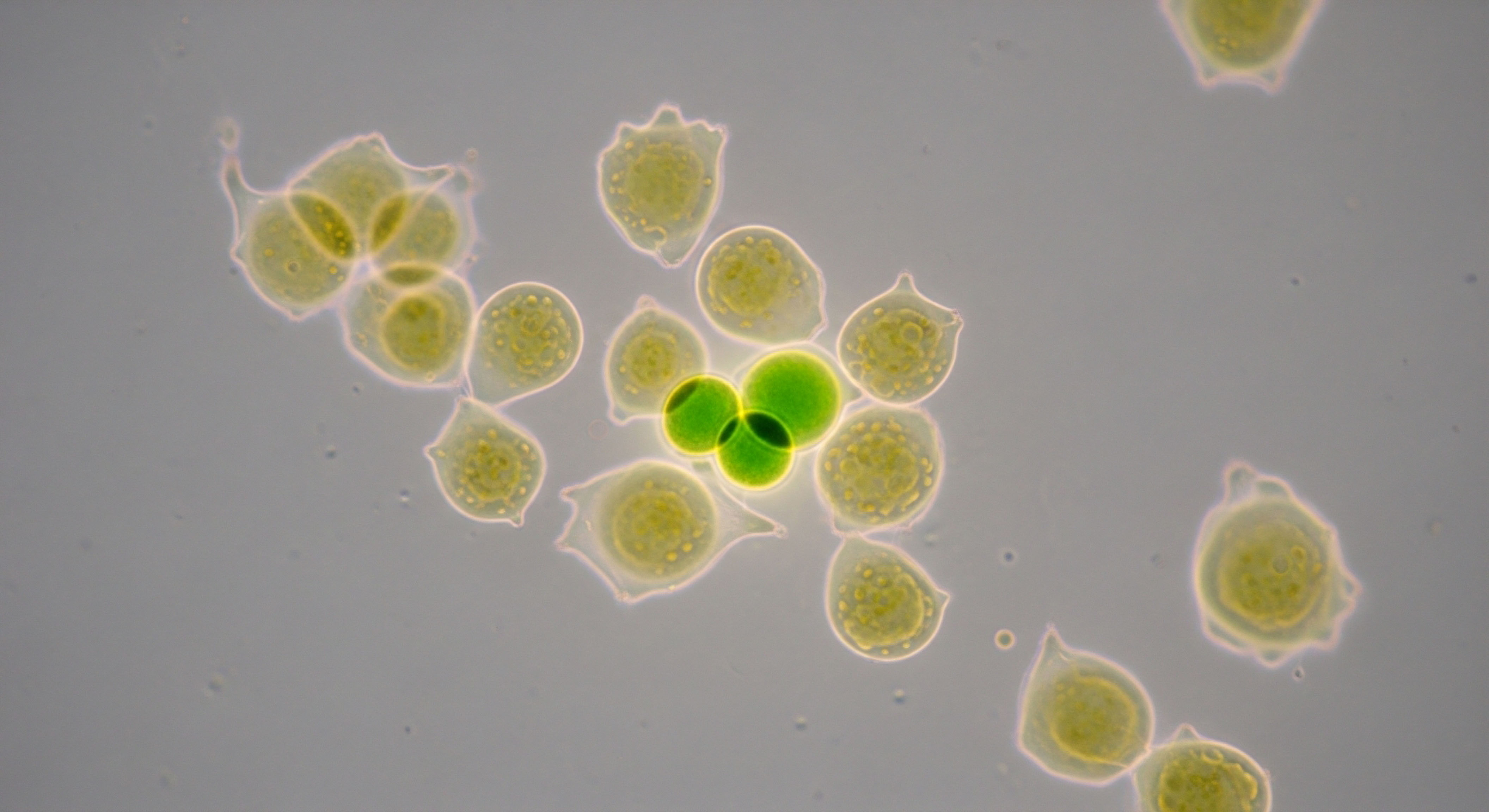

Fundamentals
Perhaps you have noticed a subtle shift in your mental landscape, a fleeting moment where a familiar name escapes you, or a persistent haze that dims your usual mental clarity. These experiences, often dismissed as simply “getting older” or attributed to stress, can be deeply unsettling.
They hint at a deeper conversation occurring within your biological systems, a dialogue orchestrated by hormones. Your lived experience of these changes is valid, and understanding the intricate mechanisms at play can be the first step toward reclaiming your vitality and cognitive sharpness.
Hormones serve as the body’s internal messaging service, carrying instructions to nearly every cell and organ, including the brain. These chemical messengers regulate a vast array of physiological processes, from metabolism and mood to sleep cycles and reproductive function. When these messengers are in balance, your systems operate with remarkable precision. When their levels fluctuate or decline, as they naturally do with age or due to various stressors, the brain, a highly sensitive organ, registers these changes.
Hormones act as the body’s essential communication network, influencing brain function and overall well-being.
The brain is not merely a passive recipient of hormonal signals; it is an active participant in this complex communication. Specialized receptors for various hormones are distributed throughout different brain regions, particularly those associated with memory, learning, and emotional regulation. When hormones bind to these receptors, they trigger a cascade of cellular events that can influence neuronal health, synaptic connections, and neurotransmitter activity. A disruption in this delicate balance can manifest as the cognitive and emotional symptoms many individuals experience.

The Brain’s Hormonal Environment
Consider the brain as a highly sophisticated command center, constantly adapting to the information it receives. This information includes signals from the endocrine system. For instance, sex steroids, such as estrogen, progesterone, and testosterone, are not solely involved in reproductive processes.
They are also recognized as neurosteroids, meaning they are produced within the brain itself and exert direct effects on brain cells. These neurosteroids play a significant role in maintaining neuronal integrity, supporting synaptic plasticity ∞ the brain’s ability to adapt and form new connections ∞ and modulating neurotransmitter systems that govern mood, motivation, and cognitive performance.
When discussing hormonal therapies and their impact on long-term brain health, we are examining how external support for these internal messaging systems can influence the brain’s resilience and function over time. This involves a careful consideration of how these therapies interact with the brain’s own intricate chemistry, aiming to restore a more optimal environment for cognitive performance and emotional stability.
The goal is to support the brain’s natural capacity for self-regulation and repair, rather than simply addressing symptoms in isolation.

Recognizing Hormonal Shifts and Brain Function
Many individuals report a range of cognitive and emotional changes as they age, often coinciding with periods of significant hormonal transition. Women frequently describe “brain fog,” memory lapses, or difficulty concentrating during perimenopause and menopause, periods characterized by declining estrogen and progesterone levels.
Similarly, men experiencing andropause, or age-related testosterone decline, may notice reduced mental clarity, decreased motivation, and shifts in mood. These are not isolated incidents; they are often direct reflections of the brain’s response to a changing hormonal landscape.
Understanding these connections is paramount. It allows for a more informed conversation about how targeted hormonal support might offer a pathway to improved cognitive function and overall well-being. The conversation moves beyond simply managing symptoms to addressing the underlying biological mechanisms that contribute to these experiences.


Intermediate
Moving beyond the foundational understanding of hormones and brain interaction, we can now explore specific clinical protocols designed to optimize hormonal balance and, by extension, support long-term brain health. These personalized wellness protocols are not about merely replacing what is lost; they aim to recalibrate the body’s biochemical systems to foster an environment conducive to optimal cognitive function and vitality.
Each therapeutic agent or peptide is selected for its specific actions within the endocrine system and its potential influence on neurological pathways.
Consider the endocrine system as a finely tuned orchestra, where each hormone is an instrument contributing to the overall symphony of health. When certain instruments are out of tune or missing, the entire performance suffers. Hormonal optimization protocols seek to bring these instruments back into harmony, allowing the brain to perform at its best. This involves a precise understanding of how various hormonal therapies interact with the brain’s complex communication networks, influencing everything from neurotransmitter synthesis to neuronal protection.

Testosterone Optimization for Men
For men experiencing symptoms associated with declining testosterone levels, such as reduced mental acuity, low motivation, or mood shifts, Testosterone Replacement Therapy (TRT) can be a significant consideration. Testosterone is a crucial neurosteroid, with receptors distributed throughout brain regions vital for cognitive function, including the hippocampus, which is central to learning and memory. It influences neurotransmitters associated with mood and motivation, acting as an anxiolytic and antidepressant.
A standard protocol for male hormone optimization often involves weekly intramuscular injections of Testosterone Cypionate. This approach aims to restore physiological testosterone levels, which can lead to improvements in mental clarity, focus, and overall mood. To maintain the delicate balance of the endocrine system and mitigate potential side effects, additional medications are frequently incorporated ∞
- Gonadorelin ∞ Administered via subcutaneous injections twice weekly, this peptide helps maintain natural testosterone production and preserves fertility by stimulating the pituitary gland to release luteinizing hormone (LH) and follicle-stimulating hormone (FSH).
- Anastrozole ∞ An oral tablet taken twice weekly, Anastrozole acts as an aromatase inhibitor, preventing the excessive conversion of testosterone into estrogen. This is important because elevated estrogen levels in men can lead to undesirable effects, including cognitive sluggishness.
- Enclomiphene ∞ In some cases, Enclomiphene may be included to specifically support LH and FSH levels, further encouraging endogenous testosterone production.
The objective of this comprehensive approach is to optimize testosterone levels while preserving the natural feedback loops of the hypothalamic-pituitary-gonadal (HPG) axis, thereby supporting not only physical well-being but also cognitive resilience.

Hormonal Balance for Women
Women, particularly those in pre-menopausal, peri-menopausal, or post-menopausal stages, often experience significant cognitive and emotional changes due to fluctuating or declining levels of estrogen and progesterone. These hormones are vital for brain health, influencing neuronal networking, neurotransmitter levels, and neuroprotection. Estrogen, for instance, promotes networking between brain cells and increases levels of mood-regulating neurotransmitters like serotonin. Progesterone also exhibits neuroprotective qualities, supporting neurogenesis and reducing inflammation within the brain.
Personalized protocols for women typically involve precise dosing to restore physiological balance ∞
- Testosterone Cypionate ∞ Administered weekly via subcutaneous injection, typically at a low dose (0.1 ∞ 0.2ml). Even in small amounts, testosterone contributes to women’s mood, motivation, and cognitive function.
- Progesterone ∞ Prescribed based on menopausal status, progesterone can be crucial for supporting sleep quality, mood stability, and its direct neuroprotective actions.
- Pellet Therapy ∞ For some, long-acting testosterone pellets offer a convenient alternative, providing consistent hormone levels. Anastrozole may be co-administered when appropriate to manage estrogen conversion.
The precise application of these therapies aims to alleviate symptoms such as irregular cycles, mood changes, hot flashes, and low libido, while simultaneously supporting the long-term health and function of the female brain.

Peptide Therapies for Cognitive Enhancement and Repair
Beyond traditional hormonal therapies, targeted peptide protocols offer another avenue for supporting brain health, particularly in areas of anti-aging, cognitive function, and cellular repair. Peptides are short chains of amino acids that act as signaling molecules, influencing various biological processes.
Growth Hormone Peptide Therapy utilizes specific peptides to stimulate the body’s natural production of growth hormone (GH) and insulin-like growth factor 1 (IGF-1). Both GH and IGF-1 have demonstrated neuroprotective and regenerative actions within the central nervous system.
Key peptides in this category include ∞
- Sermorelin and Ipamorelin / CJC-1295 ∞ These peptides stimulate the pituitary gland to release GH, which in turn increases IGF-1 levels. This can support cellular growth and repair, improve sleep quality, and potentially enhance cognitive function.
- Tesamorelin ∞ A potent GH-releasing hormone peptide, Tesamorelin has been shown to significantly increase IGF-1 levels and improve cognitive function, reduce visceral fat, and lower inflammatory markers.
- Hexarelin and MK-677 ∞ These also act as GH secretagogues, promoting GH release and offering benefits related to muscle gain, fat loss, and overall vitality.
Other targeted peptides address specific aspects of well-being that indirectly support brain health ∞
- PT-141 ∞ Used for sexual health, addressing aspects of libido and arousal that are often intertwined with overall mental well-being.
- Pentadeca Arginate (PDA) ∞ This peptide is utilized for tissue repair, healing processes, and managing inflammation, all of which contribute to a healthier systemic environment for brain function.
These peptide therapies represent a sophisticated approach to biochemical recalibration, working with the body’s innate systems to optimize function and resilience.

Post-TRT or Fertility-Stimulating Protocols for Men
For men who have discontinued TRT or are actively trying to conceive, a specialized protocol is employed to restore natural hormonal production and fertility. This protocol focuses on stimulating the body’s endogenous hormone pathways ∞
| Medication | Primary Action | Relevance to Brain Health |
|---|---|---|
| Gonadorelin | Stimulates LH and FSH release from the pituitary. | Supports natural testosterone production, indirectly influencing mood and cognitive stability. |
| Tamoxifen | Selective Estrogen Receptor Modulator (SERM), blocks estrogen’s negative feedback on the pituitary. | Promotes LH and FSH release, aiding testosterone recovery and potentially improving mood. |
| Clomid (Clomiphene Citrate) | SERM, stimulates GnRH, LH, and FSH release. | Restores endogenous testosterone production, contributing to mental clarity and motivation. |
| Anastrozole (Optional) | Aromatase inhibitor, reduces estrogen conversion. | Manages estrogen levels to optimize the testosterone-to-estrogen ratio, supporting cognitive function. |
This structured approach ensures a smooth transition and supports the body’s return to self-sufficient hormonal regulation, which is vital for sustained cognitive and emotional health.
Personalized hormonal therapies aim to restore the body’s internal balance, supporting optimal brain function and overall vitality.


Academic
To truly grasp the profound impact of hormonal therapies on long-term brain health, we must venture into the intricate world of endocrinology and systems biology. The brain, far from being an isolated entity, is deeply interconnected with the endocrine system through complex feedback loops and signaling pathways. Understanding these interdependencies provides a more complete picture of how targeted interventions can influence neuroprotection, cognitive resilience, and the very architecture of neural networks.
The concept of the Hypothalamic-Pituitary-Gonadal (HPG) axis serves as a central organizing principle in this discussion. This axis represents a sophisticated communication network between the hypothalamus in the brain, the pituitary gland, and the gonads (testes in men, ovaries in women).
It regulates the production and release of sex hormones, which, as we have seen, exert significant influence over brain function. Dysregulation within this axis, often observed with aging, is increasingly recognized as a contributing factor to neurodegenerative changes and cognitive decline.

The HPG Axis and Neuroendocrine Signaling
The HPG axis operates through a series of hierarchical signals. The hypothalamus releases gonadotropin-releasing hormone (GnRH) in a pulsatile manner. GnRH then stimulates the anterior pituitary to secrete luteinizing hormone (LH) and follicle-stimulating hormone (FSH). These gonadotropins, in turn, act on the gonads to stimulate the production of sex steroids ∞ testosterone in men, and estrogen and progesterone in women. These sex steroids then exert negative feedback on both the hypothalamus and pituitary, regulating their own production.
Age-related decline in gonadal function, known as andropause in men and menopause in women, leads to a reduction in sex steroid levels. This diminished negative feedback results in elevated levels of GnRH, LH, and FSH.
While these elevated gonadotropins might seem like the body’s attempt to compensate, research suggests that chronic dysregulation within the HPG axis, particularly the sustained elevation of gonadotropins, may contribute to neurodegenerative processes. Receptors for LH, activin, and GnRH are present in various brain regions, indicating their direct involvement in neural function beyond their classical endocrine roles.
The HPG axis, a complex neuroendocrine system, profoundly influences brain health and cognitive function throughout life.
Consider the implications ∞ if the brain is constantly exposed to altered signaling from a dysregulated HPG axis, its long-term health could be compromised. Hormonal therapies, when applied judiciously, aim to restore a more physiological balance within this axis, thereby potentially mitigating some of these age-related neuroendocrine shifts.

Sex Steroids and Brain Homeostasis
The direct actions of sex steroids on brain cells are multifaceted. Testosterone, for example, is known to reduce oxidative stress and combat inflammation within the brain, both of which are significant contributors to neurodegenerative conditions. It also enhances synaptic plasticity, the brain’s capacity to adapt and form new connections, which is fundamental for learning and memory. Furthermore, testosterone supports mitochondrial function, ensuring that neurons have the necessary energy for efficient operation.
Estrogen and progesterone also play critical roles in maintaining brain homeostasis. Estrogen promotes the growth and survival of neurons, enhances cerebral blood flow, and modulates neurotransmitter systems, including serotonin and dopamine, which are crucial for mood regulation and cognitive processing.
Progesterone, recognized for its neuroprotective properties, supports myelination ∞ the formation of the protective sheath around nerve fibers ∞ and aids in the repair of damaged brain cells. It also influences neurotransmitter balance, contributing to a calming effect and improved sleep, which are indirectly beneficial for cognitive function.
The timing of hormonal therapy initiation, particularly for women, appears to be a critical factor in its long-term cognitive effects. Studies like the Kronos Early Estrogen Prevention Study (KEEPS) Continuation Study suggest that initiating menopausal hormone therapy (MHT) close to the onset of menopause (within 3-5 years) may not pose long-term cognitive harm and could even offer some benefits, whereas initiation much later in life (e.g.
after age 70 or 10+ years post-menopause) might be associated with accelerated tau protein accumulation, a hallmark of Alzheimer’s disease. This concept, often referred to as the “window of opportunity,” underscores the importance of early intervention when considering hormonal support for brain health.

Peptide Mechanisms and Neuroprotection
The neuroprotective actions of growth hormone-releasing peptides and their downstream effects, particularly through IGF-1, represent a fascinating area of clinical science. IGF-1 is a potent neurotrophic factor, meaning it supports the survival, growth, and differentiation of neurons. It can reduce neuronal death caused by various injuries and promotes cell survival through mechanisms involving anti-apoptotic proteins like Bcl-2.
| Peptide/Hormone | Primary Mechanism of Action | Brain Health Impact |
|---|---|---|
| Growth Hormone (GH) | Direct action on brain receptors; stimulates IGF-1 production. | Promotes neuronal survival, reduces inflammation, supports mitochondrial function. |
| Insulin-like Growth Factor 1 (IGF-1) | Neurotrophic factor; activates cell survival pathways. | Reduces neuronal apoptosis, enhances synaptic plasticity, supports neurogenesis. |
| Sermorelin / Ipamorelin / CJC-1295 | Stimulate endogenous GH release from pituitary. | Indirectly boosts IGF-1, improving sleep, cellular repair, and cognitive vitality. |
| Tesamorelin | Potent GH-releasing hormone analog. | Directly increases IGF-1, improves cognitive function, reduces visceral fat and inflammation. |
| Progesterone | Neurosteroid; acts on brain cells directly. | Neurogenesis, myelination, anti-inflammatory, reduces neuronal damage. |
Peptides like Sermorelin and Ipamorelin, by stimulating the body’s own GH production, indirectly leverage these neuroprotective pathways. Tesamorelin, with its direct impact on IGF-1, has shown promise in improving cognitive function and reducing inflammatory markers, which are often implicated in neurodegenerative processes. The ability of these peptides to cross the blood-brain barrier and exert direct effects on neural tissue makes them compelling agents for supporting long-term brain health.
The scientific understanding of hormonal therapies and their impact on the brain continues to evolve. What is clear is the profound interconnectedness of the endocrine system and neurological function. By approaching hormonal health from a systems-biology perspective, and by carefully calibrating personalized wellness protocols, individuals can work toward optimizing their brain’s environment, fostering resilience, and supporting cognitive vitality throughout their lives.
This deep level of process consideration moves beyond simplistic definitions, offering a pathway to reclaim and sustain robust brain health.

References
- Buckley, Rachel F. et al. “Long-term hormone replacement therapy and tau accumulation in women with Alzheimer’s disease.” Neurology, vol. 100, no. 11, 2023, pp. e1159-e1170.
- Cherrier, Michael M. et al. “Testosterone replacement therapy improves spatial and verbal memory in older men.” Journal of Clinical Endocrinology & Metabolism, vol. 86, no. 7, 2001, pp. 3080-3088.
- Del Río, Javier P. et al. “Steroid Hormones and their Action in Women’s Brains ∞ The Importance of Hormonal Balance.” Frontiers in Public Health, vol. 6, 2018, p. 178.
- Gleason, Celeste E. et al. “Long-term cognitive effects of menopausal hormone therapy ∞ Findings from the KEEPS Continuation Study.” PLoS Medicine, vol. 18, no. 10, 2021, e1003822.
- Hertoghe, Thierry. The Hormone Handbook ∞ A Woman’s Guide to Hormonal Health. HarperCollins, 2006.
- Klaiber, Edward L. Hormones and the Mind ∞ A Woman’s Guide to the Emotional and Cognitive Benefits of Hormone Therapy. William Morrow, 1998.
- Liu, Peter Y. et al. “Aging and Hormones of the Hypothalamo-Pituitary Axis ∞ gonadotropic axis in men and somatotropic axes in men and women.” Molecular and Cellular Endocrinology, vol. 235, no. 1-2, 2005, pp. 13-25.
- Moffat, Cynthia A. and Elizabeth Hampson. “Testosterone and cognitive function in older men ∞ a review.” Psychoneuroendocrinology, vol. 21, no. 4, 1996, pp. 417-430.
- Pike, Caroline J. et al. “Estrogen and Alzheimer’s disease ∞ a new perspective.” Trends in Pharmacological Sciences, vol. 26, no. 12, 2005, pp. 673-679.
- Sherwin, Barbara B. “Estrogen and cognitive function in women.” Proceedings of the Society for Experimental Biology and Medicine, vol. 221, no. 4, 1999, pp. 302-306.
- Veldhuis, Johannes D. et al. “The aging male hypothalamic-pituitary-gonadal axis ∞ pulsatility and feedback.” Molecular and Cellular Endocrinology, vol. 235, no. 1-2, 2005, pp. 1-11.

Reflection
As you consider the intricate dance between hormones and brain health, perhaps a sense of agency begins to settle within you. The knowledge that your cognitive experiences are not merely random occurrences, but often reflections of underlying biological processes, can be deeply empowering.
This understanding is not an endpoint; it is a starting point for a more informed and proactive engagement with your own well-being. Your personal journey toward reclaiming vitality and function is unique, and it merits a personalized approach. The insights shared here are meant to serve as a compass, guiding you toward a deeper appreciation of your biological systems and the potential for optimizing them.



